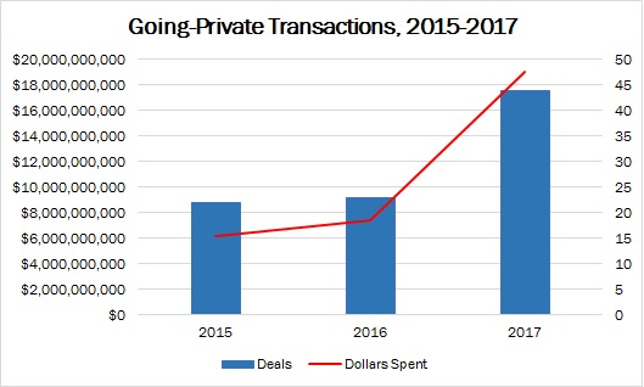Every year has its trends. In 2017, we’ve reported on mass consolidation of CROs and Physician Medical Groups, and a dip in pharmaceutical M&A, to name a few. Another trend we’ve observed is the large amount of going-private transactions in healthcare.
In the first six months of 2017, 44 going-private transactions were announced, a 38% increase from 2016 and a 91% increase from 2015.
In 2017, 45% of the 44 going-private transactions were initiated by financial buyers, and an additional 21% were announced by private equity-sponsored companies making add-on acquisitions.
In 2016, 26% of these deals were initiated by financial buyers, and another 19% were PE-sponsored add-on acquisitions. These percentages were 23% and 23%, respectively, in 2015.
Public companies may choose to go private for a variety of reasons. For some, it allows management more freedom to take on risk, they are no longer bound by quarterly SEC filings, and raising equity may be more efficient in the private sector.
One notable going-private transaction took place in October 2016, when The Blackstone Group (NYSE: BX) acquired TeamHealth Holdings, Inc. (NYSE: TMH) for $6.1 billion, or $43.50 per share. The price works out to 15.70x EBITDA and 1.47x revenue.
In May 2017, Avantor, a portfolio company of New Mountain Capital, acquired VWR Corporation (NASDAQ: VWR), a provider of laboratory products, services, and solutions to the life science, general research, and applied markets worldwide. Avantor paid $33.25 in cash per share of VWR common stock, representing an approximate 17% premium to the unaffected closing stock price on May 2. Once debt is included, the purchase price totals $6.6 billion.


